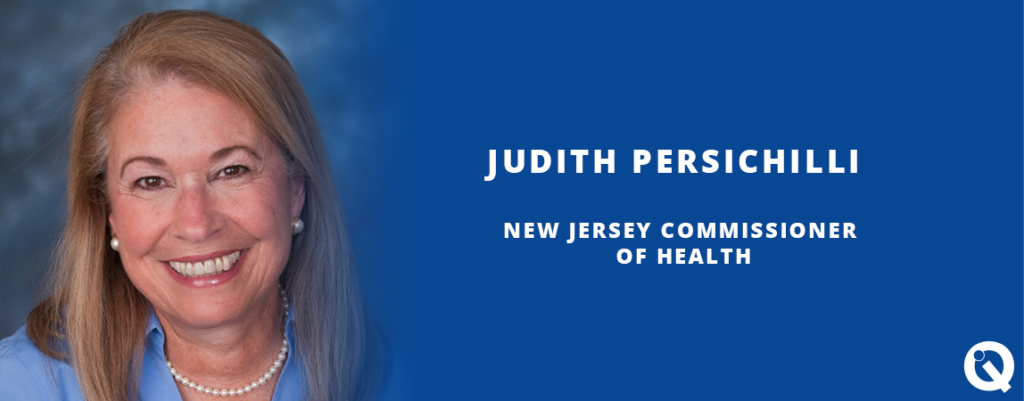Judith M. Persichilli, R.N., B.S.N., M.A., is the New Jersey Commissioner of Health. She was a founding member of the Quality Institute.
What do you see as your top priorities for health care in New Jersey?
The priorities fall into two categories, strategic and tactical. So let’s start with tactical —the issues that come up every day. A lot of them have to do with epidemiology, a lot of them about outbreaks and what we need to do on a day-to-day basis to prevent disease and keep people healthy. And that brings us to the strategic, which are the larger issues that we have to look at over time and determine how we can use data transparency to support the overall health of the population in New Jersey. And that’s looking at things such as HIV/AIDS, hepatitis, mental illness, opioid addiction … things that we know will not have quick and easy solutions. But it’s nonetheless imperative for the Department of Health to develop plans to address these issues.
You are the first nurse ever to lead the state’s Department of Health. How do you think your experience as a nurse influences your perspective as Commissioner?
I’ve always thought that providers — the people who have been on the front lines — have the knowledge and the experience to make the changes necessary and safely to promote better health and lower costs. So, nurses by education and experience have had the opportunity to provide care in all settings — from community health to acute care to mental health.
We’re the only profession that’s really educated across the full spectrum, from preconception to death. And because of that education and those experiences, I think nurses are uniquely qualified to make the changes necessary to improve processes of care safely and to advance high quality and low cost.
How do you see your work with the Quality Institute informing your work now as commissioner?
I was involved with the Quality Institute from its founding and it has taught me so much about creative and innovative thinking, and what direction we should be moving to enhance the quality of the care that’s delivered in New Jersey…Here’s an example: I was the board representative on the Medicaid 2.0 (now the Medicaid Policy Center) project. And it really showed how innovative thought and payment reform could inform improvements in the care we deliver. That’s an important aspect of the work that the Quality Institute does.
You have talked about the importance of using data and transparency as part of your plan for improving healthcare in New Jersey. Can you expand on the kinds of data you plan to gather and how you plan to use it to create change?
Change management is a special interest of mine. It’s a science that’s motivated by a lot of art. The most important thing about systemic change is you need emotion — the desire to change and the knowledge of why you need the change. And once you have the emotion, the desire, and the knowledge, then you need to have the data to provide transparency across a large spectrum of stakeholders. Data that can be understood by consumers and providers alike.
And then you need to use that data to not only inform the public and the providers, but to move payment reform and regulatory reform. And that’s what we’ve done as an example with maternal health in New Jersey, which puts us far ahead of every other state in the nation. We have transparent data in our annual report card and it shows specifically where the issues are. Our next step is to develop interventions with providers to improve mortality and morbidity. Another example is our opioid dashboard. You could go online and know exactly what is going on with the opioid epidemic in New Jersey. Where is Narcan being delivered successfully? It really points you in the direction of hotspots to focus our attention.
And finally we like to ask a question that gives some insight about people away from their professional life. So, tell us where we might find you on a sunny day outside of the office and away from cell phones and email?
Walking the beach at Bay Head.

